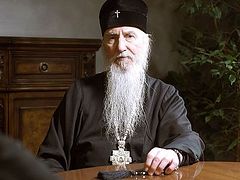On Fasting
Fasting consists not only in eating rarely, but also in eating little; and not in eating once a day, but also in not eating very much. Unreasonable is the faster who waits for a given hour, and at the hour of trapeza gives himself over to insatiable eating. In both body and mind, our reasoning mind should watch that it not choose between tasty repasts and those that are not tasty. That is what animals do, but it is not praiseworthy in a rational human. We refuse pleasant foods in order to humble the warring members of the flesh and give freedom to the actions of the spirit. A true fast consists not only in exhausting the flesh, but also in giving away to the hungry that piece of bread you would have liked to eat. Blessed are the hungry, for they shall be filled (Matt. 5:6).
Our Teacher of asceticism and Savior, the Lord Jesus Christ, before beginning the podvig of redeeming mankind, strengthened Himself with a prolonged fast. And all laborers in asceticism, before beginning to work for the Lord, armed themselves with fasting and never stepped upon the way of the cross without the work of fasting. They measured their successes in asceticism by their success in fasting.
Holy people did not begin a strict fast suddenly; they gradually, little-by-little made themselves capable of being satisfied with the poorest foods. In accustoming his disciple Dositheus to fasting, St. Dorotheus gradually took his food away from him in small portions, so that from four pounds his daily intake decreased finally to eight lots [3.6 oz.] of bread. Moreover those holy fasters were amazingly foreign to feebleness, but were always hale, strong, and ready for work. They rarely got sick, and their lives lasted extremely long. To the measure that the faster’s flesh becomes subtle and light, spiritual life reaches perfection and reveals itself in wondrous manifestations. Then the spirit performs its works in an as if bodiless body. The outward senses simply close off, and the mind, which has renounced the world, is exalted to heaven and is entirely immersed in contemplation of the spiritual world.
However, not all can place a strict rule of abstinence in all things on themselves, or deprive themselves of everything that might serve to ease infirmities. He that is able to receive it, let him receive it (Matt. 19:12). Only those foods should be taken each day so that by gathering strength, the body would become the friend and helper to the soul in perfect virtue. Otherwise it can happen that with an exhausted body, the spirit becomes weak. On Fridays and Wednesdays, especially in the four Fasts, according the example of the fathers, take food only once a day—and an angel of the Lord will cleave to you.
On Guarding the Mind
We should ceaselessly guard our hearts from indecent thoughts and impressions, according to the words of the Proverbs: Keep thy heart with all diligence; for out of it are the issues of life (Prov. 4:23).
From the diligent guarding of the heart, purity is born in it, which makes it possible to see the Lord, as eternal truth assures us: Blessed are the pure in heart, for they shall see God (Matt. 5:8).
We should not bring out what is best in the heart to the surface, for what has been gathered remains safe from seen and unseen enemies only when it is guarded like a treasure in the depths of the heart. Do not reveal the secrets of your heart to everyone.




